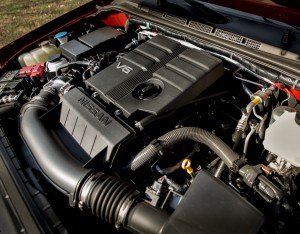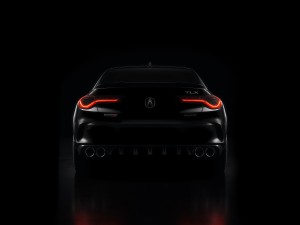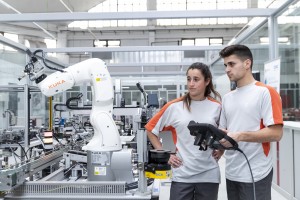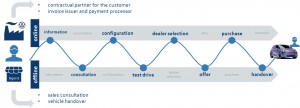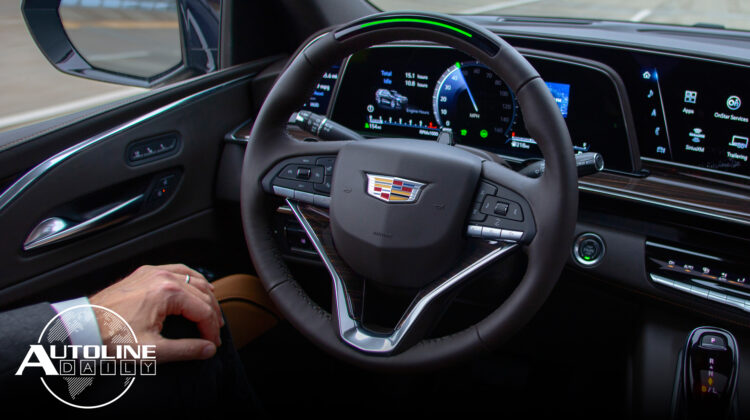

Follow us on social media:
Runtime: 11:21
0:07 Ford Defers to President on Mask Wearing
0:52 GM Says ‘Almost There’ on Million Mile Battery
1:33 Volvo Will Start Limiting Top Speed
2:08 Hyundai’s EVs Are Popular with Police
2:51 GM Working on ‘Ultra Cruise’ for City Streets
3:20 Next-Gen Tacoma Starts Production in 2023
3:49 Frontier Goes V6-Only, Sees Big Base Price Increase
4:40 Acura Teases All-New TLX
5:13 EV Chargers That Replace Gas Pumps
8:40 SEAT Holds Virtual Tours at Apprentice School
9:33 VW Will Sell EVs Direct to Customers in Germany
10:10 At-Home Tests Tricky for Dealers
Visit our sponsor to thank them for their support of Autoline Daily: Bridgestone.
This is Autoline Daily, the show dedicated to enthusiasts of the global automotive industry.
FORD DEFERS TO PRESIDENT ON MASK WEARING
Will he or won’t he? That is the question. Big buzz in the U.S. industry today about President Trump visiting a Ford factory in Michigan that’s making ventilators for Covid-19 patients. Ford originally informed the White House that it’s following CDC procedures and will not let anyone in the plant that’s not wearing a mask. But Bloomberg reports that yesterday Ford backed off a bit, and said it was up to the President to decide. When asked if he would wear a mask, Trump said, “We’ll see. Where it’s appropriate, I will.” And to see whether he does or not, this trip is going to get a lot more media coverage than it otherwise would.
GM SAYS ‘ALMOST THERE’ ON MILLION MILE EV BATTERY
As we reported last week, Tesla is expected to announce its million mile battery later this month that it developed with Chinese battery maker CATL. But General Motors is hot on its heels. Reuters reports that GM executive VP Doug Parks told investors that GM has multiple teams working on batteries with no cobalt, and on solid state batteries and ultra fast charging. And it’s working on a next generation version of the Ultium battery it unveiled two months ago. That new version is expected to last one million miles.
VOLVO STARTS LIMITING TOP SPEED
Does speed kill? Volvo seems to think so. Starting this year, all of its vehicles will have a limited top speed of 180 km/h or about 112 MPH. It’s also making its Care Key standard, which allows owners to set speed limits before lending the car to someone else. Volvo understands some might think this is controversial but it says it has an obligation to do what it can to save lives and is willing to lose customers over this decision.
HYUNDAI’S EVs ARE POPULAR WITH POLICE
Hyundai says its EVs are becoming popular with police fleets in Europe. The Kona EV is being used by law enforcement in Switzerland, the Netherlands, Spain and the U.K. And the fuel cell NEXO is being used in England and Germany. One city in Italy already has a fleet of ix35 fuel cell vehicles, the predecessor to the NEXO.
GM WORKING ON ‘ULTRA CRUISE’ FOR CITY STREETS
GM’s updated version of Super Cruise is debuting on some Cadillac models this year, but the company is developing a system that’s much more capable. CNBC reports that GM is working to take Super Cruise technology, not just on the highway, but into neighborhoods and subdivisions and onto city streets. It’s referring to the new system internally as Ultra Cruise. It is hands free but is not fully autonomous and would still require driver intervention.
NEXT-GEN TOYOTA TACOMA STARTS PRODUCTION IN 2023
A quick new product update here. Autoforecast Solutions reports that the next generation Toyota Tacoma will go into production in August of 2023. It’s built at two assembly plants in Mexico, in Guanajuato and Tijuana. The Tacoma absolutely dominates the mid-size pickup segment in North America. Last year it outsold the Chevrolet Colorado, the GMC Canyon and the Ford Ranger combined.
FRONTIER BASE PRICE INCREASED ABOUT $8K
As we reported earlier this week the next generation Nissan Frontier will not come out until 2023. But it is getting some updates this year, including an all-new, 3.8-liter V6 engine and 9-speed transmission. Those changes boost the fuel economy for V6 models by 1 mile per gallon. The new engine generates 310 horsepower, up by 49 horsepower over the previous V6. Nissan is dropping the base version that had a 4-cylinder engine with a manual transmission. Nissan also announced pricing for the 2020 Frontier which ranges from about $28,000 up to almost $40,000, and if you’d like the complete breakdown, check out the link in today’s show notes.
ACURA TEASES ALL-NEW TLX
Speaking of new models, Acura will digitally reveal the all-new TLX next week on the 28th. It only has a teaser of the rear end, but it shows the Type S will make a return to the model. With a new 3.0L turbo V6 under the hood, the Type S is said to be the quickest, best handling and most well-appointed Acura sedan yet. Stay tuned for more information.
EV CHARGERS THAT REPLACE GAS PUMPS
We know how many of our viewers are interested in anything to do with electric vehicles, so we’re ramping up our coverage. Chase Drum is the new West Coast correspondent for Autoline, working out of Oregon. He has a lifelong passion for electric vehicles, and here’s a clip from an interview he did with Wade Higgens from Freewire technologies that developed fast chargers for gas stations to go right along with gas pumps. Take a look.
Wade Higgens, Freewire:
“The boost charger we have coming out is really designed to go at gas stations. And while I mentioned that Level II are the principal ways that most people will refuel their EVs most of the time, if you do want to do road trips you need fast chargers.”
Chase Drum:
“Right Level II is what you’d find at home or maybe someone’s place of work where they have some charger set up in a parking garage. And when you want to look at this larger scale, that’s where you get to the Tesla or Electrify America DC fast charging, it’s about 150 kW or more. When you’re seeing the rollout for this technology, the biggest concern I’ve always heard about is the speed versus the cost of installation. I think that’s what’s really interesting about Freewire’s product. It really allows to bridge that gap, and allows these charging devices to be put in places where it would usually be more expensive for getting the actual concrete and foundation that might need to be torn up, or other kinds of wiring challenges. Anything you can talk to that with what you’re seeing from the implementations?”
Wade Higgens:
“Absolutely, so what you just mentioned Chase is really, in our industry, called soft costs. And soft costs can typically cost just as much as the hardware, sometimes more for installing a DC charger. And the hardware is unquestionably expensive as well. If you think about it, gas station hardware is incredibly expensive too. To build out a gas station, you’re typically looking at $1 million. And what the boost charger can do is replace a Level II charger. You can take an existing AC input that is ubiquitous out there, and you can functionally plug in a boost charger, which has a 160 kWh battery in it. So it has a relatively low impact on the grid, it’s relatively inexpensive to install, but it can still pump out 120 kilowatts DC to a vehicle, which is the sort of fast speed you expect if you’re trying to take a road trip. We’re specifically targeting gas stations because BP is obviously a gas station owner. But if you think about gas stations, Americans are already very used to going there to refuel their vehicle. But to actually install a fast charger at a gas station has some incredible complexities. You’re potentially looking at upgrading a transformer, which can easily run $50,000 to $100,000. You would need to close the gas station for several months in order to do a traditional installation which is millions in lost revenue. On top of that you’re trying to dig up a bunch of concrete and put in high voltage electrical conduit wire in an area where you already have tanks of explosive, flammable liquid in the ground as well. So installing fast chargers is unquestionably expensive and challenging. And while our hardware is unquestionably expensive, we do mitigate a lot of those costs in installation, in those soft costs that I mentioned.”
SEAT HOLDING VIRTUAL TOURS AT APPRENTICE SCHOOL
The need for new, young talent in the auto industry hasn’t gone away with the coronavirus, so to comply with social distancing measures Spanish automaker SEAT is holding a virtual Open Doors Day at its Apprentice School. The school’s head of studies, teachers and current students will take visitors through the facility and its training areas, which will give them a better idea of what day-to-day activities are like. Participants will also be able to get information on different training programs, the process for registering and everyone involved will answer any questions at the end of the tour. The training lasts for 3 years and apprentices who successfully complete the program join SEAT with an open-ended contract. The virtual tour of the automaker’s Apprentice School is today at 7pm.
VW WILL SELL EVs DIRECT TO CUSTOMERS IN GERMANY
Tesla paved the way for ordering vehicles online directly from the company. And now traditional automakers are experimenting with it. Volkswagen will allow customers in Germany to order vehicles directly online from the automaker. And they can switch between online and offline channels during the buying process if they want. But this only applies to its ID. family of electric vehicles. The customer chooses a preferred dealer and that dealer assumes the role of agent and will receive a commission from Volkswagen, even if the vehicle is purchased online.
AT-HOME TEST DRIVES TRICKY FOR DEALERS
During this coronavirus lockdown potential new car buyers are favoring online shopping and at-home test drives. But according to Wards Auto, dealers should not negotiate a price, or pitch F&I products or upsell other features at customers’ homes. If they do, they trigger a Federal Trade Commission regulation that was enacted to prevent door-to-door selling practices. If a customer did make a purchase this way, they’re allowed a 3-day cooling off period where they can cancel the sale and if they’re not told about the cool off period. And the dealer can be fined over $43,000. Wards recommends that a dealer employee not involved in the transaction deliver the vehicle and that they only validate customer identity and get the necessary paperwork signed.
But that wraps up today’s show, thanks for watching and please join us again tomorrow.
Thanks to our partner for embedding Autoline Daily on its website: WardsAuto.com

John McElroy is an influential thought leader in the automotive industry. He is a journalist, lecturer, commentator and entrepreneur. He created “Autoline Daily,” the first industry webcast of industry news and analysis.






